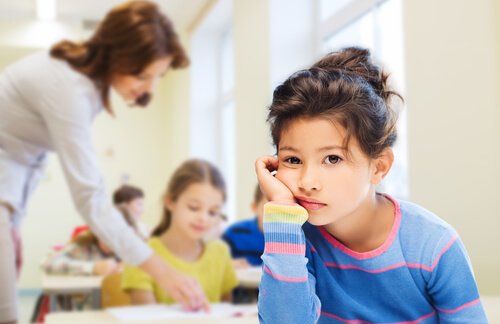Teaching Children How to Deal with Boredom: An Achievable Goal

Boredom encourages children to explore their creative side. Parents should teach their children how to deal with boredom so they can learn to use their time in a productive way.
It’s necessary to motivate children to find dynamic ways to fight boredom on their own. Looking for a positive and entertaining activity will make them think and challenge their imagination.
Parents’ reaction in facing children’s boredom
“I’m bored” – two words that worry some parents and cause no reaction of any kind in others. Some parents run to find any type of entertainment to avoid crying and tantrums, while others remain calm.
Pleasing children with things that could turn out to be very expensive for the family finances is a mistake. Giving them everything they demand will make them more dependent on you. You may even end up exhausted, tense or angry at seeing that your choices don’t please your child.
How to deal with boredom
Saying “I’m bored” is nothing more than a cry for attention from children. In reality, they don’t have solid reasons to feel bored.
Actually, parents can transform boredom into a special occasion to do something that there is normally not enough time for. Some options include preparing a delicious cupcake recipe, washing the car or giving the pets a bath. Other ideas include simple things like talking or playing a sport or a game.

Here we’ll give you some other tips that you can put into practice to teach your child how to deal with boredom:
Fun virtual learning
Being connected to the internet gives kids the possibility of combining two very important factors for their development: education and technology. Teach them how to choose didactic, entertaining and productive content online. This will allow them to have fun while learning different things.
Drawing and coloring
It has been proven that coloring helps the mind deal with situations of tension. It also allows children to unleash their creativity, while improving their mood and relaxing their mind.
Entertaining games
Board games like parchís, monopoly or dominoes, or even dancing, rehearsing group choreographies and playing in open spaces are some options.
These options allow children to be mentally and physically active. Meanwhile, they experience what it’s like to work and have fun in groups. These activities bring a special chance to be in their loved ones’ company or to gain new friendships.
Leaving home
Visiting a park, taking a walk in a mall, throughout the city or breathing in fresh air in other environments; all of that helps us forget about boredom. Going outside is a great alternative, and it always provides inspiration.

The advantages of feeling bored
The best response when children say they are feeling bored is letting them take the initiative in changing the situation. This way, they’ll be able to find something that stimulates them by their own means.
This will give them the opportunity to think on their own, instead of waiting for someone else to solve the problem. They will be more open to new ideas, and become more independent and self-sufficient.
This will also allow them to explore their creative abilities and their imagination. It will teach them how to organize their free time when they have some available.
Children who feel bored have in front of them a new world full of possibilities ready to be discovered. These can be: a new pastime or aspect of their personality, or something that will entertain them, satisfy them and raise their self-esteem.
These recommendations will allow your children to learn how to use their free time productively. Don’t forget that getting bored every once in a while predisposes the mind to imagination and opens the way toward creativity.
In the same way, boredom motivates kids to look for a solution to deal with it. Children need this time to daydream and contemplate their surroundings with calmness.
Boredom encourages children to explore their creative side. Parents should teach their children how to deal with boredom so they can learn to use their time in a productive way.
It’s necessary to motivate children to find dynamic ways to fight boredom on their own. Looking for a positive and entertaining activity will make them think and challenge their imagination.
Parents’ reaction in facing children’s boredom
“I’m bored” – two words that worry some parents and cause no reaction of any kind in others. Some parents run to find any type of entertainment to avoid crying and tantrums, while others remain calm.
Pleasing children with things that could turn out to be very expensive for the family finances is a mistake. Giving them everything they demand will make them more dependent on you. You may even end up exhausted, tense or angry at seeing that your choices don’t please your child.
How to deal with boredom
Saying “I’m bored” is nothing more than a cry for attention from children. In reality, they don’t have solid reasons to feel bored.
Actually, parents can transform boredom into a special occasion to do something that there is normally not enough time for. Some options include preparing a delicious cupcake recipe, washing the car or giving the pets a bath. Other ideas include simple things like talking or playing a sport or a game.

Here we’ll give you some other tips that you can put into practice to teach your child how to deal with boredom:
Fun virtual learning
Being connected to the internet gives kids the possibility of combining two very important factors for their development: education and technology. Teach them how to choose didactic, entertaining and productive content online. This will allow them to have fun while learning different things.
Drawing and coloring
It has been proven that coloring helps the mind deal with situations of tension. It also allows children to unleash their creativity, while improving their mood and relaxing their mind.
Entertaining games
Board games like parchís, monopoly or dominoes, or even dancing, rehearsing group choreographies and playing in open spaces are some options.
These options allow children to be mentally and physically active. Meanwhile, they experience what it’s like to work and have fun in groups. These activities bring a special chance to be in their loved ones’ company or to gain new friendships.
Leaving home
Visiting a park, taking a walk in a mall, throughout the city or breathing in fresh air in other environments; all of that helps us forget about boredom. Going outside is a great alternative, and it always provides inspiration.

The advantages of feeling bored
The best response when children say they are feeling bored is letting them take the initiative in changing the situation. This way, they’ll be able to find something that stimulates them by their own means.
This will give them the opportunity to think on their own, instead of waiting for someone else to solve the problem. They will be more open to new ideas, and become more independent and self-sufficient.
This will also allow them to explore their creative abilities and their imagination. It will teach them how to organize their free time when they have some available.
Children who feel bored have in front of them a new world full of possibilities ready to be discovered. These can be: a new pastime or aspect of their personality, or something that will entertain them, satisfy them and raise their self-esteem.
These recommendations will allow your children to learn how to use their free time productively. Don’t forget that getting bored every once in a while predisposes the mind to imagination and opens the way toward creativity.
In the same way, boredom motivates kids to look for a solution to deal with it. Children need this time to daydream and contemplate their surroundings with calmness.
All cited sources were thoroughly reviewed by our team to ensure their quality, reliability, currency, and validity. The bibliography of this article was considered reliable and of academic or scientific accuracy.
- Antón, M. C. (2012). El aburrimiento. Perspectivas en Psicología: Revista de Psicología y Ciencias Afines, 9(3), 104-109. https://www.redalyc.org/pdf/4835/483549016015.pdf
- Christian, M., & Roldán, P. Aburrimiento y Espacio.
- Ovalle, J. (1993). Poemas divertidos para niños aburridos. Editorial Universitaria.
- Salanova Soria, M. (2009). Organizaciones saludables, organizaciones resilientes. http://repositori.uji.es/xmlui/handle/10234/73232
- VELASCO, J. R. CURA CONTRA EL ABURRIMIENTO. LA FILOSOFÍA COMO RESISTENCIA ALES, 103.
This text is provided for informational purposes only and does not replace consultation with a professional. If in doubt, consult your specialist.








